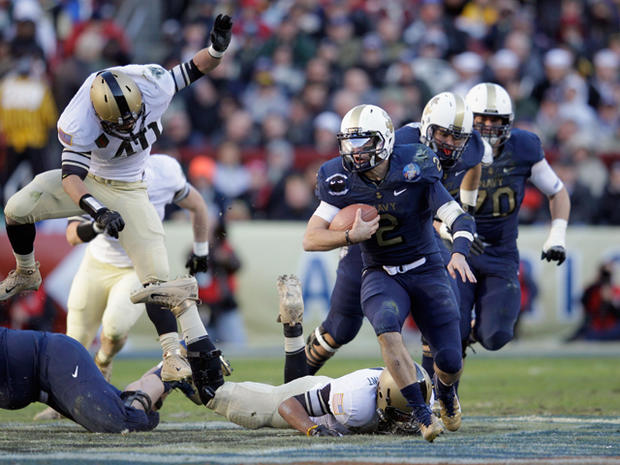Concussions double between seasons for 3 college football teams: Better diagnosis?
(CBS News) Concussions are a major issue in professional football, and a new study suggests the same risk may be present in college programs.
Watch: Dangers of college sports concussionsBrain scan study spotlights risks of high school football, hockey
Preliminary research presented today at the American Orthopaedic Society for Sports Medicine's annual meeting in Baltimore finds a significant increase in the number of concussions reported at three college football programs between seasons.
The study compared concussion rates among football players who played for the Army, Navy and Air Force teams during the 2009-2010 season with rates for the 2010-2011 seasons, and found the number of concussion jumped from 23 reports to 42 reports in that time span.
During the study period, all players were between 18 and 22. During a given practice, about 150 players participate and during games, 90 players suit up.
The findings may not however indicate that more players are getting hurt, but may be a function of increased awareness and new concussion measures the NCAA put in place in April 2010.
The current guidelines call for a process for annual education for student-athletes about signs and symptoms of concussions, a requirement that says athletes displaying concussion symptoms should be removed from athletic activity and evaluated by medical staff, a policy that precludes student-athletes diagnosed with concussions from returning to the game the same day and a policy that requires medical clearance from a physician to return to athletic activity.
"The timing of the new NCAA regulations and the increase in reported concussions could certainly be attributed to under-reporting from players and coaches in the past," study author Dr. Kelly Kilcoyne, a researcher at Walter Reed National Military Medical Center in Washington, DC., said in a press release. "Such an increase is still notable, and we need continued studies in football and other sports to find out more."
About 1.6 to 3.8 million concussions occur in sports and recreation activities each year, according to the NCAA. Symptoms may vary in sufferers, but the Mayo Clinic says symptoms could include headache, temporary loss of consciousness, confusion or a foggy feeling, amnesia surrounding the trauma, ringing in the ears, "seeing stars," and nausea or vomiting. Hours or days after the injury, symptoms may progress to depression, sleep disturbances, personality changes, sensitivity to light and noise, and memory problems.
"If they sustain head trauma or concussions in their late teens and early 20s, the window for repetitive injury is lengthened," Dr. Robert Glatter, an emergency medicine physician at Lenox Hill Hospital in New York City, told HealthDay. "The long-term complications of repetitive head trauma can have lasting effects on younger athletes into their adult years."
Repeated blows to the head and concussion over time has been tied to the degenerative brain disease, chronic traumatic encephalopathy (CTE), as evidenced from brains donated posthumously from the families of football players, boxers and hockey players.
According to Boston University's Center for the Study of Traumatic Encephalopathy, CTE evidence has been seen in college-age athletes, namely 21-year-old University of Pennsylvania offensive lineman Owen Thomas was found to have the disease following his 2010 death from suicide.
The concussion issue has come to a head in recent years, with suicides of high-profile NFL players such as Dave Duerson and Junior Seau. Duerson's brain was found to have evidence of CTE in an autopsy following his February 2011 death. The family of Junior Seau agreed on Thursday to donate his brain to research.

